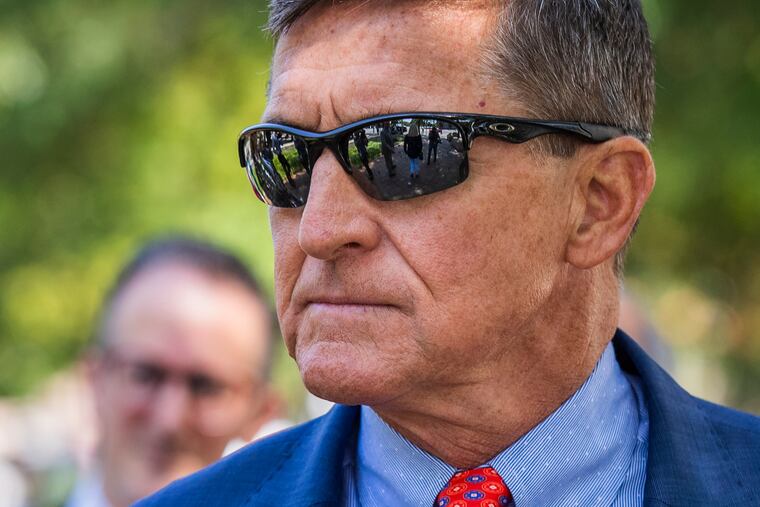Judge says he is not required to ‘rubber stamp’ DOJ’s bid to dismiss Michael Flynn case
Judge Emmet Sullivan should not be required to act as a "mere rubber stamp" for the government's unusual move to undo the guilty plea of President Donald Trump's former national security adviser Michael Flynn, the judge's lawyers told a federal appeals court in Washington on Monday.

WASHINGTON - Judge Emmet Sullivan should not be required to act as a "mere rubber stamp" for the government's unusual move to undo the guilty plea of President Donald Trump's former national security adviser Michael Flynn, the judge's lawyers told a federal appeals court in Washington on Monday.
Sullivan's attorneys asked the appeals court to stay on the sidelines to give the judge an opportunity to ensure the "integrity of the judicial process" and to rule on the Justice Department's request to dismiss Flynn's case.
The judge must evaluate Flynn's dramatically different claims, Sullivan's lawyer Beth Wilkinson told the court: "What, if anything, should Judge Sullivan do about Mr. Flynn's sworn statements to the court, where he repeatedly admitted to the crime and to the voluntariness of his guilty plea, only to now claim that he never lied to the government and was pressured and misled into pleading guilty?"
The filing from Sullivan, defending his investigation into the Justice Department's reversal, is the latest development in the extraordinary case. It comes after Flynn's lawyers asked the U.S. Court of Appeals for the D.C. Circuit to immediately order Sullivan to get rid of the matter and accused him of bias.
The Justice Department joined Flynn in a separate filing Monday, urging the appeals court to quickly bring the case to a close. The executive branch, not the judiciary, has the "power to decide when - and when not - to prosecute potential crimes" and Sullivan cannot independently initiate criminal charges, the filing says.
Federal rules do not give the judge the authority to "stand in the way of a dismissal the defendant does not oppose," according to the filing. Those who signed the filing include Solicitor General Noel Francisco, Assistant Attorney General Brian Benczkowski, acting U.S. Attorney Michael Sherwin and Jocelyn Ballantine - the remaining career prosecutor on Flynn's case, who did not sign the government's May 7 motion to dismiss the case.
Sullivan refused to go along in early May when the government moved to abandon its long-running prosecution of Flynn, who admitted lying to the FBI in 2017 about his conversations with Russia's ambassador to the United States before Trump took office. The department's change of heart came after Attorney General William Barr determined that the FBI had no valid basis to question Flynn, so any lies he told were irrelevant to former special counsel Robert Mueller's investigation into Russian interference in the 2016 election.
The decision to undo a guilty plea prompted criticism and alarm, including from former DOJ officials and law enforcement leaders, concerned that the department was bending to political pressure from the Trump administration.
The appeals court agreed to review Sullivan's actions and gave the judge 10 days to respond to Flynn's request.
With the government and Flynn now on the same side, Sullivan defended the decision to appoint retired federal judge John Gleeson to argue against the department's position. Gleeson is also charged with examining whether Flynn should face a criminal contempt hearing for perjury after pleading guilty to a crime that he and the Justice Department now say did not happen.
"Someone needs to fill the adversarial gap to ensure full consideration of the issues, and a former prosecutor and federal judge is well positioned to do so," Sullivan's lawyers told the court. "In any event, Judge Sullivan's record shows that he will not blindly accept Judge Gleeson's recommendations."
For more than two years, the government took the position that Flynn's false statements to the FBI were material and relevant. As recently as January, prosecutors recommended the judge sentence Flynn to up to six months in prison. Sullivan's filing notes that the move to dismiss the case was not signed by any front-line prosecutors who had previously worked on the case.
"It is unprecedented for an Acting U.S. Attorney to contradict the solemn representations that career prosecutors made time and again, and undermine the district court's legal and factual findings, in moving on his own to dismiss the charge years after two different federal judges accepted the defendant's plea," Sullivan's lawyers wrote.
The department emphasized in its filing Monday that the reversal had come after "extensive review and careful consideration." The government said the judge could not conduct additional proceedings "based on speculation about the government's motives."
In its filing, the department objected to Sullivan's plans to "subject the Executive's prosecutorial decision to extensive judicial inquiry, scrutiny, oversight, and involvement. Under the Supreme Court's and this Court's precedents, it is clear and indisputable that the district court has no authority to embark on that course."
There is disagreement among legal scholars and former judges over how Sullivan should handle the case at this juncture.
Prosecutors have broad authority to make charging decisions, but federal rules require prosecutors to get permission from the presiding judge to formally dismiss criminal charges. In this case, Flynn pleaded guilty under oath before two different judges, and he told Sullivan at a 2018 hearing that no one had coerced him to admit his guilt and that he had no intention of taking back his plea.